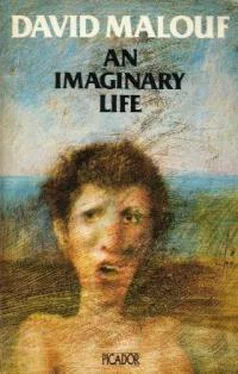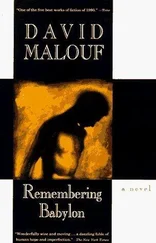I measure the weeks by how many guard duties I have done. One night in five I go out for four hours and man the wall, pacing up and down on a wooden parapet, just below the spiked summit of the palisade, with twenty others. On clear nights it can be beautiful: the moon high among clouds, the river flats bluish, broken with thick shadow, the whole countryside open as far as the eye can see, all the way to the river. On such watches you can see the wolves moving in packs over the snow, and if it is still enough, hear them howling. Sometimes a lone wolf will come right up to the wall, and once or twice a whole pack will appear, showing their fangs in the moonlight and filling the air with their terrible yowling, as they smell the beasts in their stalls, and the oxen, the asses, hearing their howls, make their own uneasy bellowing and braying in return. But most nights we just pass up and down in the fog that swirls around us like the sea, moving like blind men with one hand extended before us on the narrow walk. The four hours then are like another kind of sleep. There is nothing for the eye to fix on and every sound is dampened. It is gray, dreamless sleep, that makes the knees ache and tightens the skull, and I have the greatest difficulty preventing myself then from falling into real sleep, and may be plummeting twelve meters into frozen mud. The Child meanwhile has fallen into a state of apathy in which he sits for hours simply staring into the gloom, his elbows round his knees, his chin sunk on his clenched fists. He still quickens at moments, cocking his head for the rising of the wind after a lull or sniffing suddenly as the snow clouds move in upon us; and in the breaks of brilliant stillness when the windows can be opened, he becomes almost crazy with joy, rocking on his heels at the edge of the sill, and making little whimpering sounds like a puppy that has been let off the leash. But in the long periods when we are closed in by fog or snow, or by the severity of the frost, he sinks back into his old sullenness, and nothing will call him out of it. He feeds if the food is set in front of him. But he shows no interest now in our speech games, and I fear he will forget most of what we have learned. Once, when I tried to engage him again by making one of the calls he had been teaching me, he became quite hysterical. All that my futile attempt at a birdcall had done was remind him of the place in the swamp that we have not visited now for three months or more, and I realize, painfully, that he does not understand, cannot understand, why we no longer go there or why our games have ended. Does he think I am punishing him? One clear night, when we opened the windows, he tried to throw himself out, and I had to wrestle with him at the sill, while he kicked and uttered the raucous animallike cries that have once again convinced the old woman that he is no child but a beast in disguise who has wheedled his way in among us. She watches him continually. She is terrified, I think, that he may touch something, some utensil, and thereby gain power over its users. And it is true that in his long hours of simply sitting, staring before him, he seems in no way like a normal child; and when he growls in his throat, or whimpers or makes little yelping sounds in his pain, even I begin to wonder if some animal spirit does not occasionally come creeping back into him - some spirit that succored him out there in the winter forest. He survived then. Can he survive now? I watch him retreat further each day into some invisible distance, some secret lair, where his spirit slumbers and cannot be recalled. Looking at him on occasions, I have a clear glimpse of what he is doing. He is dreaming himself out into the winter countryside. I see him, briefly, moving over the soft snow among the birch trees, chewing strips of bark, kneeling to tear up lichen. I touch his shoulder, and he feels nothing. The black eyes, sunk deep in their sockets, stare through me, to dazzling fields of ice under the wind. When he quickens to a change of weather, it is, I realize now, to the change that comes over a landscape he is moving through in his head. If I thought we might find him again in the spring, I would let him go. But that is impossible. Having brought him in among us there is no way back. Already, in the warmth of the room, he is losing his capacity to withstand cold. For weeks now he has wrapped himself, like the rest of us, in a blanket of hide. Out there he would freeze. Whatever his secret was, I have taken it from him. He is as vulnerable now as anyone of us, and in that at least -even if the old woman does not see it - he shows himself human at last.
As if to prove what I have just perceived, the Child has a fever. Sitting as he does with his knees drawn up, staring, he suddenly pitches over and lies in a faint, but when I move to cover him, he wakes, and almost immediately begins shivering. Huge beads of sweat break out on his brow, his hair drips with it, his whole body streams. And in between the periods of burning, he freezes. I think he has never known before what it is to be cold. His whole body clenches on it, this new feeling, this discovery within himself of what winter means, what it is to be snow and ice, to feel oneself enter the realm of absolute cold, that polar world at the body’s limits. He draws his knees up, closing upon himself. Every muscle in his limbs, his shoulders, his neck, goes rigid, his fists clench, his jaws tighten. He looks terrified, and when the convulsions begin I have to hold him, forcing a knife handle between his teeth, while he jerks, stiffens, goes through a whole series of spasms, and then sinks exhausted into a kind of nerveless sleep. Then again, the sweating. As I raise him in my arms and try to force a few drops of water between his lips, I am reminded of my brother, and realize what he means to me this Child, what it might mean to lose him.
The old woman watches from across the room. I know what she is thinking. This is no ordinary fever. The Child is wrestling with his demon, the animal spirit who protected him out there in the forest, and is fighting now to get back. When I appeal to her for some medicine, some of the herbs she gathers and makes potions of, she shakes her head and turns her thumb down, spitting. I have to watch the Child day and night. If she thought for even a moment that the spirit might triumph and enter the Child’s body again, she would cut his throat. I know it. But the younger woman, who has a child of her own and is softhearted, cannot bear to see the boy writhe as he does, and sweat, and shiver, and jerk about under the rugs. Secretly, she brings me food for him and a bowl of clean water. I hear the old woman arguing with her, and I know what she is saying. What if the Child gave up the struggle, and we found ourselves shut up here with the giant white wolf who is his familiar, and who might at any moment succeed in filling the Child’s body and then breaking out of it. The fever, she believes, is part of the painful transformation. The Child’s blood boils and freezes, as drop by drop it is being changed. The Child’s belly cringes for the raw meat that is the wolf’s diet. His limbs strain to grow claws. His jaw clenches against the growing there of fangs. And what if it isn’t a wolf after all? But some other beast? Larger, more terrible than even she can imagine. The young woman quails. And I see a new doubt has been sown in her mind. What if the beast, finding the Child too difficult to conquer, chose the body of her own son instead? It would be so easy. While we are all sleeping, our bodies empty in the dark, the Child’s spirit slips out, crosses the room, enters her son’s body - and there, it is done!
For two whole days the young woman refuses to come near us. She watches the Child, she watches her son, she keeps the boy as far from our corner of the room as possible, while the old woman whispers and flaps about between us. But in the dead of night, when the Child’s fever is at its crisis, and I am forced to call for help, it is the younger woman who stirs in the dark, wraps herself in her cloak, and comes with water. I am desperately tired and through sheer exhaustion, after nearly five days of watching, seem always on the verge of tears. My hand shakes so much that I cannot lift the bowl to the Child’s lips.
Читать дальше












